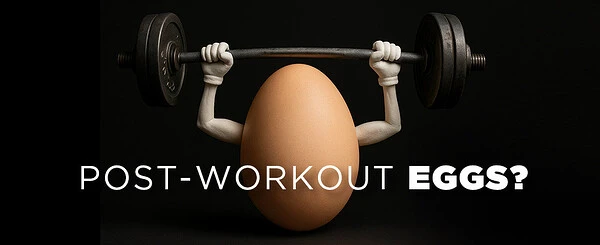Title: Post - Workout Eggs: A Closer Look at the Research
Author: Chris Shugart
Introduction
A fascinating study delved into the practice of consuming eggs post - weightlifting. However, the question lingers: did the researchers reach an accurate conclusion? It's essential to approach research findings with a discerning eye. For instance, there was a case where a group of researchers declared meat consumption as unhealthy. Their conclusion was based on a study of individuals who consumed a large number of fast - food burgers. Given the health issues these subjects had, the researchers attributed the blame to the beef in the hamburgers. Yet, a cursory analysis reveals flaws in this claim. These subjects were also consuming substantial amounts of bread, fries, and sugary beverages.
When it comes to muscle - building research, it can be argued that those with practical experience in the gym, often referred to as "meatheads", bring a unique perspective. These are individuals who have personally experimented with various diets and supplements. Their hands - on experience gives them a stake in the game and a different vantage point compared to traditional researchers. The study on eggs, as we will see, presents an interesting divergence between the researchers' conclusion and that of the "meatheads".
The Egg Study
Protein synthesis is the fundamental biological process underlying muscle building. In this study, researchers aimed to determine whether egg whites or whole eggs would trigger more protein synthesis following a leg - focused workout.
Methodology:
Ten weight - lifting individuals were recruited. They underwent a workout regime consisting of leg presses and extensions.
Blood and muscle biopsy samples were collected to assess whole - body leucine kinetics, intramuscular signaling, and myofibrillar protein synthesis.
The participants were divided into two groups. One group consumed whole eggs post - workout, while the other had egg whites. The protein content was standardized at 18 grams for both groups.
Results:
Both groups experienced benefits from the post - workout protein intake. However, the group that consumed whole eggs demonstrated significantly higher protein synthesis compared to the group that had only egg whites, despite the equal protein content.
Researchers' Interpretation:
The researchers hypothesized that the additional anabolic components in egg yolks, such as microRNAs, various vitamins and minerals, phosphatidic acid, palmitic acid, and DHA, were responsible for this difference.
A Different Interpretation
While the researchers' assertion about the benefits of whole eggs is not without merit, as egg yolks indeed offer valuable nutrients, there is another factor to consider. The whole - egg eaters consumed approximately 150 more calories post - workout compared to the yolk - less group. A whole egg contains around 70 calories, with 17 calories in the white and 53 in the yolk.
Dr. Bill Campbell, a researcher with practical gym experience (a "meathead PhD"), posits that the extra calories may have been the determining factor in the increased muscle protein synthesis. Protein synthesis occurs in two phases: initiation and elongation. The initiation phase depends on leucine to start the process, while the elongation phase requires calories to sustain it. The whole - egg eaters, having consumed more calories, may have had an advantage in this regard.
So, What Do I Eat After Training?
In summary, post - training nutrition should consist of an adequate amount of protein along with some additional calories from carbohydrates or fats. The key is to ensure sufficient protein intake. In the aforementioned study, the lifters consumed only 18 grams of protein, which is relatively low. Nevertheless, some protein synthesis still occurred, even in the lower - calorie group. Other research indicates that 20 grams of protein is a decent amount, but increasing it to 40 grams can result in a 20% greater stimulation of muscle protein synthesis.
However, the optimal protein intake also depends on the extent of muscle activation during a workout. If only a few muscles are targeted, 20 grams might suffice. But for more comprehensive workouts, such as full - body sessions or high - volume upper/lower splits, more protein is required.
The whole - egg - eating group in the study had around 210 calories after training. Compiling multiple related studies, it can be suggested that for serious lifters aiming for muscle hypertrophy, consuming at least this number of calories along with 40 grams of protein is ideal.
An easy way to achieve this is by consuming a two - scoop protein shake. A shake containing micellar casein is particularly beneficial as it can further enhance muscle protein synthesis. For example, MD Protein (available on Amazon) provides 220 calories and 42 grams of micellar - infused protein.
Regarding eggs, they can be consumed whole at any time of the day. While they offer anabolic benefits, there is no particular advantage to eating them specifically post - workout.
Reference
- Vliet, et al. "Consumption of whole eggs promotes greater stimulation of postexercise muscle protein synthesis than consumption of isonitrogenous amounts of egg whites in young men." Am J Clin Nutr. 2017 Dec;106(6):1401 - 1412. doi: 10.3945/ajcn.117.159855. Epub 2017 Oct 4.
The Head-Scratching Egg Study
•
Author: Hamid
•
fitness
sport
life

Share this article
